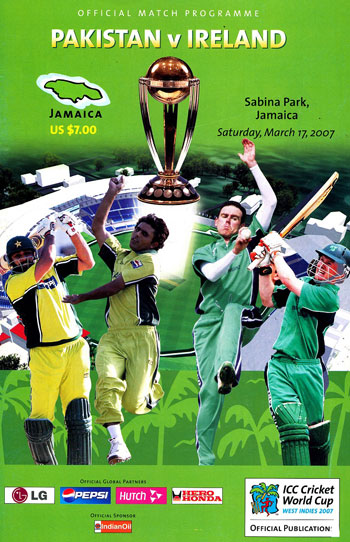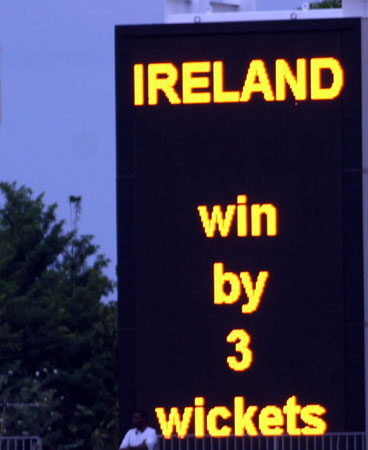


Ireland and Pakistan had met three times, the last one being back in 1987. Of those three Pakistan had won 2 and the other was drawn. Neither side had any representatives from the last time the teams had met.
Ireland were unchanged for this game. Pakistan had lost their opening game in the Group to West Indies. Pakistan had some problems with injuries and suspensions. Their two quickest bowlers, Shoaib Akhtar and Mohammad Asif failed drug tests some months ago and had been suspended for a year. However, an appeal to the Pakistan Cricket Board was successful, mush to the chagrin of the general sporting world. ICC had initiated proceedings to bring the matter to the Court of Arbitration in Lausanne. However, at the last minute both bowlers were said to have injuries and were left out of the Pakistan squad. There was a feeling that there may have been internal drug tests held which suggested they were not clear of the drugs and might have failed a test at the World Cup. In addition one of their most explosive players, Shahid Afridi, who had been one of Ireland's overseas players in last year's C & G tournament, had been suspended for four ODI's as a result of an incident in the tour of South Africa and therefore was not available for this match. Pakistan left out Danish Kaneria, their leg spinner for this game. While the pitch might not have suited him, nevertheless the Irish team, given their inexperience in playing top class spinners, will not have been too disappointed.
Richard Gillis, Irish Times
 Niall O'Brien hooks
Niall O'Brien hooks
After a Paddy's Night to remember, the players and their travelling band of supporters are looking forward to the very real prospect of a trip to Guyana, and the probable first match against England on March 30. If West Indies and Pakistan beat Zimbabwe, Ireland are through. In all, qualification for the Super Eights would involve seven games over three weeks on a tour of duty also taking in Barbados and Grenada.
"Luck of the Irish" shouted the front page of the Jamaican Sunday Herald today after one of the biggest shocks in World Cup history. They got it wrong. When big teams go down, there is a thirst for analysis. How could it happen? This one is pretty simple to call. Ireland bowled better, fielded and batted better. Far from being felled by a puncher's lucky strike, Pakistan, ranked fourth in the world, were dismembered with precision by Ireland's group of semi-professional club players. But for a blip in fading light towards the end of the day, it was a clinical piece of work.
To put the bowling performance in context, this is the second lowest total scored by Pakistan in a World Cup. Ireland reached Pakistan's revised total of 128 with three wickets in hand and 5.2 overs to spare. Over the last week Jamaica have extended a warm welcome to the travelling Irish, and on Saturday took their hospitality to a new high. The groundsman produced a Paddy's Day wicket that owed more to Croke Park than Sabina Park, green and grassy, with an underlying dampness. The toss was critical. Captain Trent Johnston's smile when the coin came down revealed all. "We'll have a bowl", he told the waiting TV anchor. And bowl they did, Langford-Smith removing opener Mohammad Hafeez with just seven on the board. The Pakistan middle order is arguably the best in the world. Collectively Younis Khan, Mohammad Yousuf and Inzamam-ul-Haq have amassed over 40,000 runs in all forms of international cricket. On Saturday they scored 16 between them. Last year Yousuf scored more test match runs in a calendar year than anyone in history, beating Vivian Richards 1976 record. He came to the wicket here at 15-2. He stroked two cover-drives that banged in to the boards of the Party Stand, as if demanding silence. He went trying a third, caught at point by William Porterfield, an exceptional fielder.
 A big appeal by Rankin
A big appeal by Rankin
The Ireland innings began under a pewter sky, the light marginal for play. Sami immediately looked menacing. Bending the ball into the left-hander's pads at just over 90 mph, lbw was a constant threat. Porterfield survived a close call the umpire believing, wrongly, the ball had hit bat before pad, a let off. But perhaps making up for his error, umpire Brian Jerling gave the first of two genuine shockers, giving Jeremy Bray out to a ball that started on middle before swerving wide of leg stump. One down and Bray, the hero of the Zimbabwe game, gone. Just what Ireland wanted to avoid. Then Eoin Morgan went to another lbw from Sami. Nerves were frayed. An innings of substance was needed. Enter Niall O'Brien. His 72 won the game for Ireland on a pitch where no other batsmen reached 30. He walked to the wicket short of runs, not that you'd know it from his demeanour, his chin held high under his green helmet. There is substance beneath the bullish, cocky front. A series of beautifully timed off-drives added impetus to the innings at the right time. His technique is compact, and he plays straighter than most. His defensive shots were hitting mid-offs hands, a good sign.
 The scoreboard says it all!
The scoreboard says it all!
Offered the light, the batsmen scampered off. Then the rain came. So happy to see it were the massed ranks in the Party Stand they stood staring into the sky arms outstretched. Two days away from home and you start to miss the stuff. When the innings resumed, Pakistan's total of 132 had been reduced by 5 for the delay. Niall O'Brien advanced down to hit six over mid-on. He went next ball, stumped attempting a repeat. A flurry of wickets followed. This was nerve-shredding staff. Flame-haired Kevin O'Brien was stoic. The figures do him little justice. This was a 16 of gargantuan proportions. With 10 needed, he hit a square cut. The ground erupted, the tension pierced. The Pakistani fielders chased it down in vain. The crowd moved en masse to a reggae beat. The giant inflatable leprechaun was getting a pummelling. One last blow, a six over mid-on by the captain, and Ireland were home.
The Man-of-The-Match award went to Niall O'Brien for his fine knock. In the context of this match it was probably worth a century in many another game. During the course of his innings, when he reached 62, he became the 43rd batsman to reach 1,000 runs for Ireland, in his 32nd Match and 33rd innings.
The Irish celebrations after this game were muted when news broke the following morning of the death of Pakistan coach Bob Woolmer. He had been found unconscious in his room and was taken to hospital but died without regaining consciousness. A few days later the Jamaica police announced that he had been strangled, after it initially appeared that death might have been due to natural causes. The ICC announced that the World Cup would continue as scheduled but obviously the murder of Woolmer was the story that gained the World headlines.
Ireland suffered their own tragedy when the death occurred of Bob Kerr, former Chairman and President of the ICU, in Jamaica where he, together with his wife Hope, was supporting the team.
